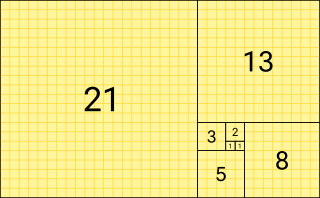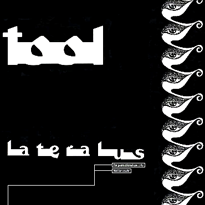Related Research Articles

In mathematics, the Fibonacci sequence is a sequence in which each number is the sum of the two numbers that precede it. Numbers that are part of the Fibonacci sequence are known as Fibonacci numbers, commonly denoted Fn . Many writers begin the sequence with 0 and 1, although some authors start it from 1 and 1 and some from 1 and 2. Starting from 0 and 1, the sequence begins

Fibonacci was an Italian mathematician from the Republic of Pisa, considered to be "the most talented Western mathematician of the Middle Ages".

Lateralus is the third studio album by the American rock band Tool. It was released on May 15, 2001, through Volcano Entertainment. The album was recorded at Cello Studios in Hollywood and The Hook, Big Empty Space, and The Lodge, in North Hollywood, between October 2000 and January 2001. David Bottrill, who had produced the band's two previous releases Ænima and Salival, produced the album along with the band, and became the last Tool album produced by Bottrill to date. On August 23, 2005, Lateralus was released as a limited edition two-picture-disc vinyl LP in a holographic gatefold package.

Dame Evelyn Elizabeth Ann Glennie, is a Scottish percussionist. She was selected as one of the two laureates for the Polar Music Prize of 2015.

Sofia Asgatovna Gubaidulina is a Soviet-Russian composer and an established international figure. Major orchestras around the world have commissioned and performed her works. She is considered one of the foremost Russian composers of the second half of the 20th century along with Alfred Schnittke and Edison Denisov.
89 (eighty-nine) is the natural number following 88 and preceding 90.
The King's Singers are a British a cappella vocal ensemble founded in 1968. They are named after King's College in Cambridge, England, where the group was formed by six choral scholars. In the United Kingdom, their popularity peaked in the 1970s and early 1980s. Thereafter they began to reach a wider American audience, appearing frequently on The Tonight Show Starring Johnny Carson in the United States. In 1987, they were prominently featured as guests on the Emmy Award-winning ABC television special Julie Andrews: The Sound of Christmas.
Graham Fitkin is a British composer, pianist and conductor. His compositions fall broadly into the minimalist and postminimalist genres. Described by The Independent in 1998 as "one of the most important of our younger composers", he is particularly known for his works for solo and multiple pianos, as well as for music accompanying dance.

The Omnichord is an electronic musical instrument introduced in 1981 by the Suzuki Musical Instrument Corporation. It allows users to play distinctive harp-like arpeggios produced through an electronic strum plate, simulating the experience of playing a stringed instrument. Originally conceived as an electronic Autoharp, the Omnichord found popularity due to its portability, its unique timbre, and its value as a kitsch object.
The programming language APL is distinctive in being symbolic rather than lexical: its primitives are denoted by symbols, not words. These symbols were originally devised as a mathematical notation to describe algorithms. APL programmers often assign informal names when discussing functions and operators but the core functions and operators provided by the language are denoted by non-textual symbols.

"Lateralus" is a song by American rock band Tool. The song is the third single and title track of their third studio album Lateralus.

Bruce Martin Woolley is an English musician, singer, songwriter, and record producer. He wrote songs with artists such as the Buggles and Grace Jones, including "Video Killed the Radio Star" and "Slave to the Rhythm", and co-founded the Radio Science Orchestra.
In mathematics, the Fibonacci numbers form a sequence defined recursively by:
The Fibonacci numbers are a sequence of integers, typically starting with 0, 1 and continuing 1, 2, 3, 5, 8, 13, ..., each new number being the sum of the previous two. The Fibonacci numbers, often presented in conjunction with the golden ratio, are a popular theme in culture. They have been mentioned in novels, films, television shows, and songs. The numbers have also been used in the creation of music, visual art, and architecture.

André Ristic is a Canadian composer, pianist, accordion player, and music theorist. He has won several awards, including the Jules Léger Prize for New Chamber Music in 2000 for his work Catalogue de bombes occidentales, the Prix Opus for Composer of the Year in 2002, and the Prix Québec-Flandre in 2003.

Ashley Thomas, also known by his stage name Bashy, is a British actor and rapper.
Stephen Stirling is a soloist, chamber musician, and a Professor of Horn at the Trinity Laban Conservatoire of Music and Dance in London.

Julie-Anne Derome is a Canadian violinist who was born in Montreal, Quebec.
Ania Safonova is a Russian-Israeli violinist, the Associate Concertmaster of the Royal Opera House, Covent Garden. She has recently been appointed as Director of the ManningCamerata Chamber Players.

Hawklords is a British space rock band. The band started as a one-off ensemble of musicians formerly associated with Hawkwind, and playing Hawkwind covers. Although the band uses the same name as the short-lived 1978 incarnation of Hawkwind, it is not a reunion or tribute, though three of the original 1978 Hawklords members were in the band when it reformed, but are not currently members.
References
- ↑ " "Our repertoire". www.fibsonline.co.uk. Retrieved 15 November 2023.
- ↑ Maisel, Andrew (4 October 2009). "Fibonacci Sequence at Kings Place". www.classicalsource.com. Archived from the original on 7 October 2009. Retrieved 8 April 2016.